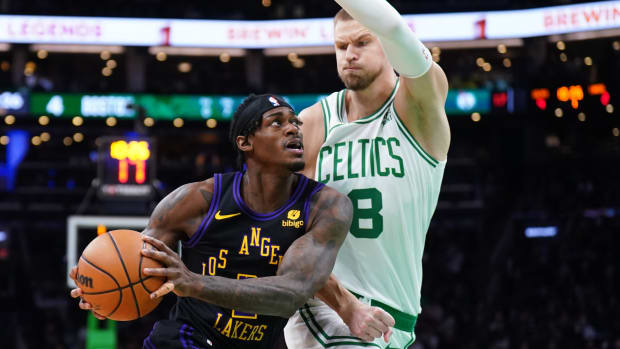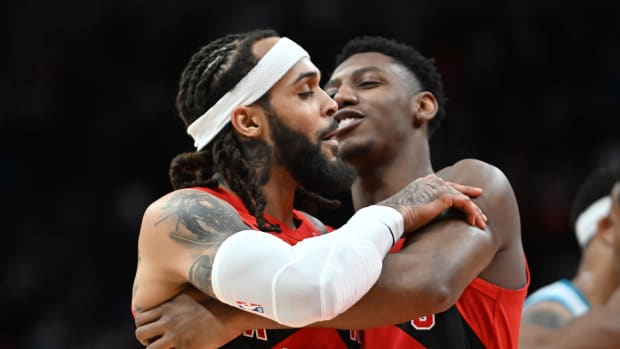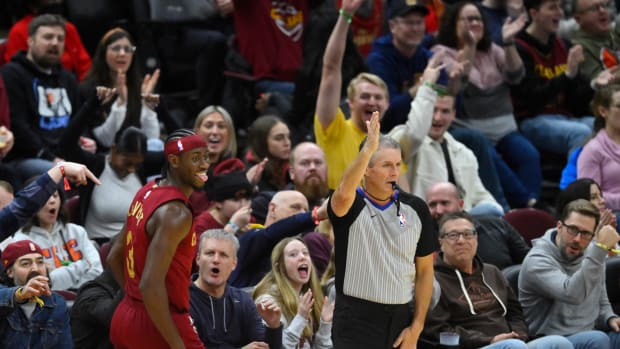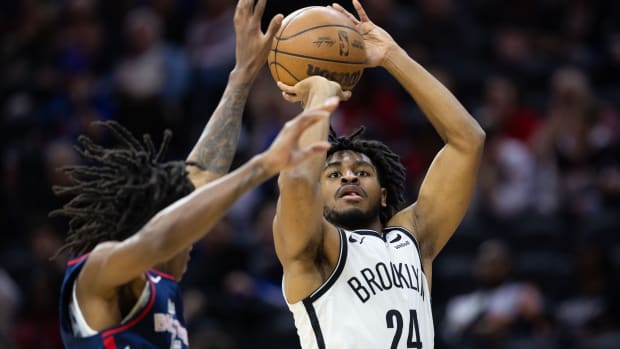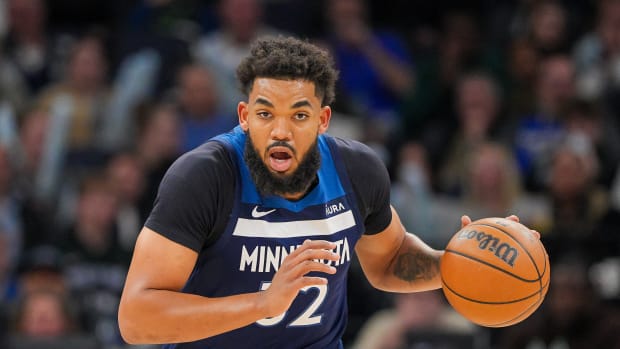How the Heat Built Themselves Back Into Eastern Conference Contenders
At the start of last season, the five players comprising the Heat’s current starting lineup weren’t even ships passing each other in the night of the NBA‘s waters, they were closer to worlds apart. Kendrick Nunn was an undrafted player coming off the bench for the Warriors—the Santa Cruz Warriors of the G League. Jimmy Butler was teaming up with third-stringers in Minnesota trying to engineer his exit from the Timberwolves. Duncan Robinson was a project at the end of Miami’s bench who made the roster largely due to a swath of injuries. Meyers Leonard was firmly entrenched as a backup big in Portland. And Bam Adebayo was stuck behind the highly paid Hassan Whiteside in the Heat’s rotation.
A little over a year later, that group—Nunn, Butler, Robinson, Leonard, and Adebayo—has shockingly formed one of the most effective units in the NBA. (Their net rating of 18.3 is fourth-best among lineups that have played at least 100 minutes together.) And the success of Miami’s starting five is emblematic of the whole roster, a group of players who entered the league without much pomp or circumstance. That roster is now on pace to win something in the neighborhood of 60 games, something the franchise hasn’t done since LeBron James, Dwyane Wade, and Chris Bosh were its headliners.
The Heat have been consistent only in their ups and downs since the breakup of the Big Three almost six years ago. Their journey back to the kind of success expected by Pat Riley can be traced to one character trait shared by Miami’s head coach down to the 15th man on the roster: An obsession with work.
---
“I went to a dark place,” Erik Spoelstra admits. The typically reticent Spo is looking back on the summer of 2015, the first time as a head coach he had missed the playoffs, a moment that ultimately proved to be a pivotal one for his career moving forward. It was during that period when Spoelstra realized over the last few years, thanks in large part to the constant pressure of the Big Three era, he had become a coach too maniacally preoccupied with the “final result.”
“I had to reflect and recalibrate during a long offseason,” Spoelstra says. “I set a course to be a different kind of coach, one that fits my identity and purpose a little bit more. I had to apologize to a few players along the way. I wasn’t the coach I wanted to be, and more importantly, I wasn’t the coach they needed me to be.”
In his unending desire to win, Spoelstra realized he was no longer serving the players on his roster, which was the reason he entered the coaching profession in the first place. As an assistant, he went out of his way to cater to his players’ needs, the kind of person who would give a player a ride home from practice if he saw him walking down Biscayne Boulevard. As the head coach of a superteam, Spo was “swallowed up” by the obsession of winning the last game.
The summer-long introspection led to a reinvented version of Spoelstra, and paved the way for Miami’s new identity for the second half of this decade. The franchise that was once derisively described as “Hollywood as hell” has become the place where castoffs go to thrive. The overall results haven’t always been great. For every Rodney McGruder or Wayne Ellington breakout year, there’s been a season that ended prematurely. But the commitment to work is beginning to pay dividends thanks to a roster that’s fallen into place. With the combination of Spoelstra’s refocus on service and the front office finally catching a whale in Butler, the Heat are reaching their platonic ideal. Miami has a superstar it can count on, and a bunch of hungry role players exceeding outside expectations.
Nunn started the season scoring at least 20 points in three of his first five games, and through a quarter of the season, he’s Miami’s third-leading scorer. Robinson is 14th in the league in threes made, ahead of megawatt names like Devin Booker, Donovan Mitchell, and C.J. McCollum. Leonard is shooting over 50% from beyond the arc this season, and the Heat have a 101.9 defensive rating with him on the floor, a vast difference from where he was in Portland. And Adebayo, who entered the league as something of an athletic curiosity, has gone from an energy big to offensive fulcrum, directing traffic from the elbow, blossoming into one of the league’s most under-the-radar passers and an absolute menace on the defensive end. All have grown dramatically from where they were a year ago or at the start of their careers.
“The coaching here, the development here on and off the court, it’s a championship culture,” Nunn says. “You come in and work hard every day. If you’re an all-time pro, this is somewhere you can thrive.”
“There are no wasted days whether you’re in the rotation or not,” Robinson says. “The coaching staff is always looking how to maximize, that’s just the biggest emphasis. If you put in the work, at the end of the season you have a lot to show for it.”
“We’re not for everyone in the way we work and the way we’ll push you,” Spo says. “But we hope it’s a place you’ll never regret it, because we give you our heart and soul.”
It’s not just the starters who have thrived in this environment. Chris Silva, an undrafted backup center on a two-way contract, has become an essential sparkplug off the bench and is already drawing comparisons to local icon Udonis Haslem for his tenacity. (You can tell whenever Silva is in the game because he immediately begins gobbling up offensive rebounds like a Hungry Hungry Hippo.) Tyler Herro was a somewhat controversial lottery pick who flashed in the preseason, and has since confidently shot nearly 40% from three in over 28 minutes a game as one of the league’s most productive rookies. Meanwhile, Butler has provided just enough superstar turns, and has made up for some shaky efficiency by averaging the most assists per game in his career. And Justise Winslow and Goran Dragic remain as steady, positive forces with years of institutional knowledge.
The Heat were a little bit of a mystery headed into the season. There was no doubt Spoelstra could coach, but it was unclear what the best of this roster could realistically produce. With everyone from Spo down the line zeroed in on improvement, the results are now coming naturally.
“We’ve done this long enough. You want to be open to any possibility to be able to uncover the best potential out of the team,” Spoelstra says when asked if he expected this level of contribution from everyone on the roster.
It sounds somewhat counter-intuitive when Spo describes shifting his focus away from the final result as what has brought him purpose over the last few years of his career. But with the Heat no longer the star-laden outfit they’ve always strived to be, Spoelstra has been able to mold a team more in his own image. As McGruder—now a member of the Clippers—explains, players in Miami are well aware of their coach’s story.
“The process coach Spoelstra had to take to get that head coaching job, starting as a video guy, is similar to the route that a lot of undrafted guys had to take,” McGruder says. “Spo really respects those guys. If you keep persevering, it goes a long way.”
Spoelstra, loathe to talk about himself, deflects any credit. He says his motivation to serve his players comes from their hard work. He points to players like McGruder as an inspiration. His favorite stories are about watching players master their craft, like three seasons ago, when he’d come to the practice facility to watch—through a door window—Wayne Ellington launch threes with an assistant coach on days he was supposed to be locked out of the gym.
“The character and fortitude of the players we’re talking about, they found the perseverance to make their dreams happen when doors were closed initially,” Spoelstra says. “That internal fortitude is a talent unto itself. That’s as much of a talent as a player coming into the league with a 45-inch vertical. I want to work harder for those kinds of guys. We will do anything, literally anything, to help those guys achieve their dreams.”
Of course, the Heat’s success isn’t as simple as the coaching staff’s focus on development and a bunch of hard work. Otherwise, a lot of other teams would also be successful. Miami also has good players who make sense together, and through its first 21 games of the season, the team has put together an interesting profile.
The Heat have the eighth-best net rating in the league at 5.0, ahead of teams like the Sixers, Nuggets, and Rockets. Of Miami’s six losses, four have come on the road on the second leg of a back-to-back—three coming at the hands of playoff teams. The Heat are the only team this season to win in Milwaukee or Toronto. They’re also undefeated at home, where they’ve played only eight times compared to 13 on the road. Miami isn’t quite in the same stratosphere as the Bucks, but the Heat have proven they can compete in the East’s robust second tier, which includes the Raptors, Sixers, Celtics, and perhaps the Pacers.
That’s not to say everything is perfect. The Heat’s frontcourt of Adebayo and Leonard is susceptible to bulky centers or very athletic center-forward pairings. Nunn’s hot start has given way to inconsistent outings over the last few weeks of the season. And it’s unclear how the trio of Adebayo, Butler, and Winslow will work together—three essential players who all deserve to be on the floor in closing time. The early returns have been a clunky offense and a hellacious defense, but it‘s a group that could be exploited in a playoff series if it can’t score. (Adebayo adding a reliable free-throw line jumper to his game could help this combo significantly.)
Miami is probably one more All-Star type player away from true title contention, and while Riley will always be looking, it may be hard to acquire that type of guy with players like Kyle Lowry and Bradley Beal seemingly off the trade market. The cap sheet is finally clean—particularly for 2021, when Giannis Antetokounmpo looms—so the franchise making a hasty move would be a little surprising. Maybe someone shakes free. Or maybe someone like Dion Waiters or James Johnson dusts off the cobwebs and gives the Heat some of what they lack (like ball-handling or an athletic four), but for now, from top down, Miami is firing on all cylinders, and there’s ample reason to believe it could crash the conference finals.
“We have great chemistry, we really enjoy playing with each other, and we really enjoy each other’s success, which is not always the case in this league,” Robinson says. “My minutes can change drastically from one night to the next. I just focus on my job and that’s being ready. Guys are willing to do their job at a high level and not butt heads about it.”
---
The story of the Heat’s decade can cleanly be told in two acts, the Big Three, and everything after. The franchise’s perception went from Hollywood to Hard Hat over the last five seasons, and the work is paying off better than it ever has before. The individual success stories are now resulting in much more team success. And while Spo may find his joy in serving, he’s quick to point out the NBA is a “bottom-line” business, and he says his first responsibility is fulfilling the dreams of Riley and Micky Arison—men he praises as visionaries and titans—who imagined hanging banners in the Heat’s downtown Miami arena before it was even built.
“We are who we are, we like who we like, we do what we do, and we’re able to survive the tough times,” Spoelstra says. “We have that organizational, corporate knowledge, that even though the teams change and shift, and we have tough times, we can bounce back a little quicker than when you’re having to start over all the time. I’ve been given that opportunity to reinvent and grow as a coach, but also be an upholder of this culture.”
That culture—the word that can be found everywhere in the Heat’s home and that often draws eye rolls from fans and media alike—can best be described by the former G-Leaguer turned starter and third-highest scoring rookie in the NBA.
“I love working hard and I love winning,” Nunn says. “You can’t ask for no better.”

































